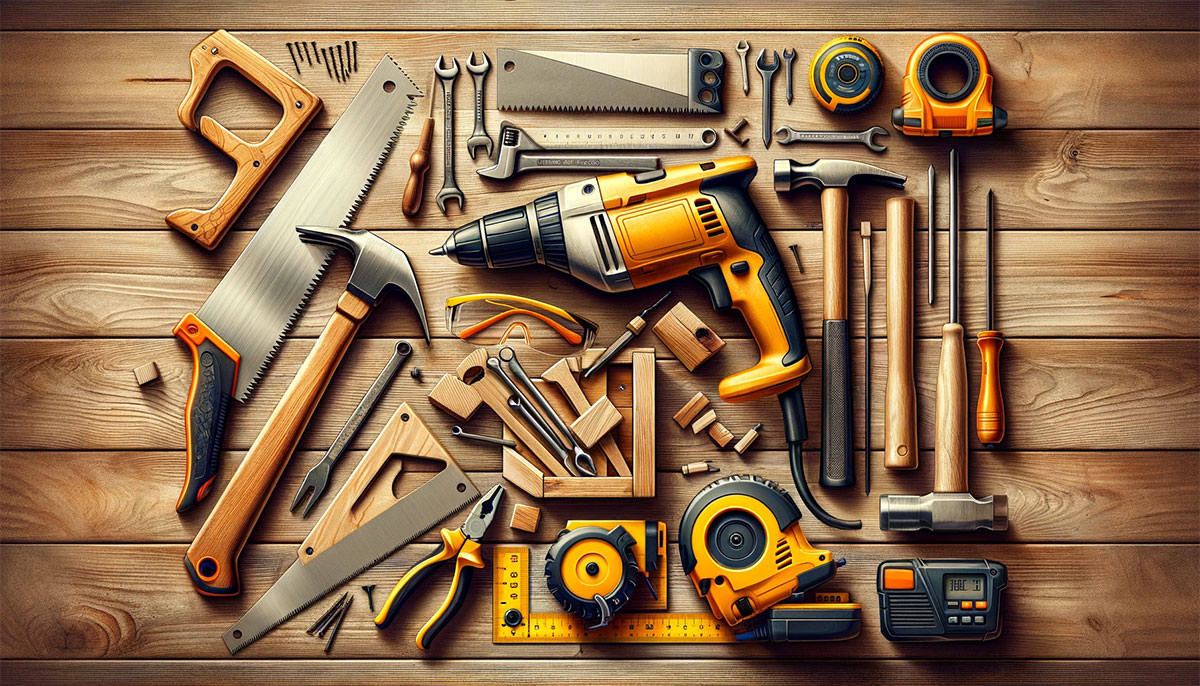Woodworking, an age-old craft, blends creativity, precision, and the right tools. Whether you’re a budding hobbyist or an experienced woodworker, the tools you use profoundly impact the quality and enjoyment of your work. This guide will walk you through the essential tools needed at various stages of your woodworking journey, from basic hand tools to advanced power tools, ensuring you are well-equipped to bring your projects to life.
Basic Tools for Beginners
Hand Tools
Starting with hand tools is an excellent way for beginners to learn the fundamentals of woodworking. A hand saw is indispensable for cutting pieces to size. Invest in a good quality saw that feels comfortable in your hand. Chisels are used for carving and shaping wood; a basic set of chisels in various sizes is essential. A hand plane is vital for smoothing and flattening surfaces. For assembling and disassembling projects, a reliable hammer and a set of screwdrivers are must-haves.
Power Tools
When you’re ready to speed up the process and tackle more complex projects, power tools come into play. A power drill is versatile for drilling holes and driving screws. A circular saw offers more precise cuts than a hand saw and is essential for larger projects. For finishing, a random orbit sander is far more efficient than manual sanding and leaves a smoother finish.
Measuring and Marking Tools
Precision is key in woodworking. A measuring tape and a carpenter’s square ensure accurate measurements and angles. A marking gauge is useful for marking out precise cuts and joints.
Safety Gear
Never overlook safety. Always use safety glasses to protect your eyes, hearing protection to guard against loud tools, and dust masks to prevent inhalation of sawdust.
Advanced Tools for Intermediate and Expert Woodworkers
Precision Cutting Tools
For more advanced woodworkers, precision cutting tools are vital. A table saw offers versatility and accuracy for straight cuts. A miter saw is excellent for making accurate crosscuts and miter cuts. For intricate curved cuts, a jigsaw is indispensable.
Shaping and Finishing Tools
A router is used for creating profiles on the edge of wood. A planer ensures wood pieces are uniform in thickness. Different sandpaper grit varieties are essential for smoothing and finishing wood surfaces.
Specialty Tools
For specific tasks and fine craftsmanship, specialty tools like a dovetail saw, a set of wood chisels, and a lathe for woodturning can expand your capabilities.
Tool Maintenance and Care
Keeping Tools Sharp
Maintaining the sharpness of your tools is critical. Sharpening stones are necessary for chisels and plane blades. Regular blade maintenance for saws, including cleaning and sharpening, will extend their life and efficiency.
Storage and Organization
Proper storage and organization of tools prevent damage and loss. Tool cabinets and wall-mounted racks keep tools accessible and in good condition. A well-organized workbench can make your woodworking more efficient and enjoyable.
Setting Up Your Woodworking Space
Essential Workshop Features
A good workshop needs adequate lighting for precision and safety. A dust collection system is crucial for maintaining a clean and healthy workspace. A sturdy workbench is the heart of any woodworking shop.
Space Saving Tips
Maximize your space with vertical storage solutions. Mobile bases for heavy equipment can make your workshop more versatile. Consider foldable work surfaces for flexibility in smaller spaces.
Tips for Expanding Your Tool Collection
When to Upgrade Tools
As your skills develop, upgrading your tools becomes necessary. Transitioning from a hand saw to a table saw, or upgrading to a compound miter saw, can significantly improve the quality and scope of your projects.
Adding Specialty Tools
As you tackle more complex projects, consider adding specialty tools. Understanding when to invest in tools like a wood lathe, band saw, or scroll saw can broaden your woodworking capabilities.
Woodworking is a rewarding and creative hobby that can evolve into a skilled craft. Starting with basic tools and gradually expanding your collection as your skills grow allows you to tackle a wide range of projects. Remember, the right tools not only make the job easier but also enhance the enjoyment and quality of your work.
Additional Resources
For further reading and resources, consider exploring tool buying guides, joining woodworking community forums, and watching online tutorials. These resources can provide invaluable advice and inspiration as you embark on or continue your woodworking journey.





